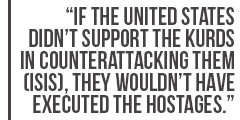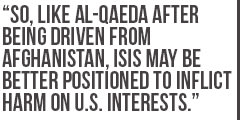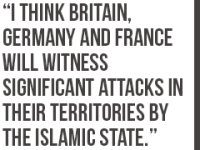“I think Britain, Germany and
France will witness significant attacks in their territories by the
Islamic State. Al-Baghdadi [the leader of the Islamic State of Iraq and
Syria, otherwise known as ISIS] may reconcile with al-Zawhiri [the
leader of the al-Qaeda central organization] to fight the crusader
enemy.
The attacks by the United States and her allies will unite the
two groups,” said Hisham al-Hashimi,
an Iraqi researcher who just finished writing a book about ISIS based
on his unique access to the organization’s documents and years of
research and advising Iraqi security forces.
The break between the Islamic State and al-Qaeda
ISIS and al-Qaeda have a long, tangled history with one another. ISIS was the al-Qaeda official branch in Iraq until last February. However, they finally split after disagreements over operations in Syria.
The recent US intervention in
the region along with the new US-led airstrike campaign against ISIS has
actually forced the two groups to renew negotiations. For example, recent reports suggested
that ISIS and al-Nusra Front are together planning the war against the
US-led alliance. The al-Qaeda affiliated Khorasan group in Syria that
was also targeted in the recent air attacks declared a few days ago in
an audio message that it had joined ISIS. Add to that the Taliban in Pakistan who are hopping on board the ISIS train and you have a potential jihadi World War III.
Other experts think that ISIS could be dissolved and swallowed by al-Qaeda, leading to the same result. “The Islamic State has killed many of al-Qaeda’s operatives in Syria and Iraq.... I think that al-Baghdadi will be killed, either by an attack by the U.S.-led alliance or by al-Qaeda.... The Islamic State doesn’t have the elements of survival like the al-Qaeda mother organization. It is most likely that it will be dissolved within al-Qaeda,” said Ibrahim al-Somaidaei, an Iraqi security analyst and former intelligence officer based in Amman, Jordan.
The Structure and the Strategy
Understanding who is responsible for big decisions within ISIS is critical to making sense of the group’s activity. According to al-Hashimi, ISIS has a written doctrine similar to a constitution. This document was authored by a man called Abdallah Abdul Samed al-Ani, who is considered the main theorist of the ISIS.
The group’s decisions are divided into three
categories. The first contains decisions made at the highest level by
the emirate council headed by Baghdadi, the council of the resolution
and decision also headed by Baghdadi, and the Shura council headed by
Abu Ala al-Afri. “These decisions are very rare…like the decision of
declaring the Caliphate and the decisions of rebellion on al-Zawahiri
and Mulla Omar…they represent great hardship.” added al-Hashimi.
The second category specifies
decisions made by the emirate council only. “These decisions are made to
declare war or open new fronts or execute foreign hostages,” said
al-Hashimi. The third category represents all other decisions made at
the regional leadership level by the 24 governors or the numerous field
commanders and religious leaders, each responsible for their
jurisdiction.
When analyzing ISIS’s main
decisions since the take over of Mosul in June, it's clear that second
and third category decisions are common. For example, the decision to
advance to Tikrit in June was taken by the field commander of the region
after the collapse of the Iraqi government forces and to control the
Beiji oil refinery, the largest refinery in Iraq.
“They have declared their target: the formation of a Caliphate state
and they declared Iraq and Syria as a destination for Jihadis to
immigrate from all over the world…. Controlling the Beiji refinery is
one of the means to enable the so-called state,” said Luay Jawad
al-Khatteb, a visiting fellow at the Brookings Institution Doha Center.
The same economic drive was behind controlling the Iraqi border towns
with Syria and Jordan in June and the Syrian border towns with Turkey in
August. These decisions were made by the emirate council and several
local governors. Economic grounds were behind last July's attacks on
Syria’s largest oil field, al-Omar as well as the al-Shaer gas field in
Homs Governorate, Syria and the dams in Mosul and Haditha in Iraq in
August.
 If major economic decisions generally involve higher-level leaders,
decisions about how to rid regions of remaining non-Sunni populations
were mostly taken by regional governors or the field commanders. This
is because ISIS has given a clear prescription for dissenters. ISIS’s
doctrine describes four kinds of dissenters: those who were Muslims
before and converted from "their" Islam, like the Shiites according to
ISIS, Christians, and Jews; and those who are none of the above like the
Yzidis.
If major economic decisions generally involve higher-level leaders,
decisions about how to rid regions of remaining non-Sunni populations
were mostly taken by regional governors or the field commanders. This
is because ISIS has given a clear prescription for dissenters. ISIS’s
doctrine describes four kinds of dissenters: those who were Muslims
before and converted from "their" Islam, like the Shiites according to
ISIS, Christians, and Jews; and those who are none of the above like the
Yzidis. Shiites are to be killed at once. Christians can live after paying the tax or jizya. Jews are technically like Christians, but because of the Arab – Israeli conflict, they suffer the same fate as Shiites. Yazidis are to be offered Islam first, and if they refused to convert, then they should be killed. The recent decisions to kill Yazidi men and boys, take Yazidi women as slaves, and seize their property were taken by the Governor of Ninevah. “What ISIS wants to prove is that it is completely loyal to its guiding philosophy and it doesn’t want to bargain. They consider themselves the most extreme Jihadi group and the most pure,” said Harith Hassan, a fellow at the Radicliffe institute at Harvard University.
The decision to kill hundreds of Shiite prisoners in Mosul in June, hundreds of Shiite Iraqi army soldiers in Tikrit in June, and again hundreds of Shiite Iraqi soldiers near Fallujah in September were made by field commanders. Decisions to kill 200 Syrian soldiers, militiamen and staff at the al-Shaer gas field in Homs province, Syria in July, 250 Syrian army soldiers in al-Tabqa airbase in Syria in August, and hundreds of Syrians from the al-Sheitaat tribe in northeastern Syria after two weeks of fighting over oil fields in August, were taken the same way. The latter incident was also to set an example to deter other tribes from revolting against ISIS in the future.
The Governor of Ninevah gave an ultimatum to Christians residing in Mosul to convert to Islam or pay the tax or leave the city of Mosul, or face death in July. Ninevah Governor, Abu Bakr al-Khatuni, was also behind the confiscation of all Christian belongings and properties and the decision to destroy the shrines of several Jewish prophets in Mosul. However, according to Hashimi, ISIS waited one month and a half to implement the decisions taken over fate of Mosul’s Christians and the Jewish prophets’ shrines.
This was to ensure control of the city first, allowing the destruction of Shiite mosques to immediately follow the victory.
The victory in Mosul allowed ISIS to declare a new caliphate. Mr. Hassan thinks the decision to declare a caliphate – a crucially important decision for the group made by the three councils – was meant to confirm the victory. “It sent a message to the other competing regional groups that the battle is over…and to win more volunteers and financial support from those attracted by the idea of the realization of caliphate…” added Hassan.
 ISIS has proven many times that it believes preemptive attacks are
the best form of defense. This includes opening new fronts to distract
the enemy from a main attack and to reduce impacts of enemy assaults on
their weakest points.
ISIS has proven many times that it believes preemptive attacks are
the best form of defense. This includes opening new fronts to distract
the enemy from a main attack and to reduce impacts of enemy assaults on
their weakest points.For example, the attack on Mosul in June took place after such distraction attacks in Samarra and Ramadi. “In its response to the killing of al-Beilawi, its Iraqi military commander and the second man in command after Baghdadi, ISIS used its standard style in such situations, which is to launch an invasion to prove its presence,” said Nibras al-Kadhumi, a fellow at Hudson Institute who specializes in Islamic extremism. Al-Beilawi was killed a few days before the fall of Mosul by the Iraqi Special Forces. Hundreds of electronic memory cards were recovered with him containing the organization’s most important secrets, leading ISIS to launch the strategic assaults.
Important decisions over the attack on the Kurdistan region were second-tier decisions, such as the emirate council’s preemptive assault to expand the Islamic State last August. The president of the Kurdistan region gave a speech in late July and threatened ISIS, provoking the ISIS attack. “The Islamic State attacked the Kurds in Sinjar, Ninevah plains and the Mosul dam after Barazani’s speech. The Kurds have a good relationship with other competing Sunni groups that could threaten ISIS’ control over Mosul…” said Mr. al-Sumaidaei.
This decision is one of the group’s most unwise ones, according to al-Hashimi. Baghdadi has attempted to integrate Kurdish populations by choosing a Kurdish commander to lead the assault near Erbil, the regional capital. This advance was stopped only by the U.S. air strikes. A similar incident happened in the August joint attack with al-Nusra Front against the Lebanese town of Arsal in response to the arrest of a commander of al-Nusra Front by the Lebanese authorities.
 A last example of a preemptive attack by ISIS was the assault on the
Syrian Kurds in the border with Turkey in the last few weeks. The Kurds
in Syria fought against the Syrian rebels for years, but a new front was
announced lately to start a joint Kurdish-Syrian rebel effort to fight
ISIS with the support of the United States. Baghdadi decided to foil
that effort before it began.
A last example of a preemptive attack by ISIS was the assault on the
Syrian Kurds in the border with Turkey in the last few weeks. The Kurds
in Syria fought against the Syrian rebels for years, but a new front was
announced lately to start a joint Kurdish-Syrian rebel effort to fight
ISIS with the support of the United States. Baghdadi decided to foil
that effort before it began.Particularly upsetting solutions have already been taken by high-level authorities. For example, decisions to execute two American journalists, two British aid workers and two Lebanese soldiers in August and September, and the release of about 50 Turkish diplomats and 30 Turkish drivers in June and September, were made by the council of emirates. In the case of execution, revenge and failed blackmailing was the reason.
“If the United States didn’t support the Kurds in counterattacking them [ISIS], they wouldn’t have executed the hostages. They kept them alive for a year,” said Salem Aljomaily, a former Iraqi intelligence officer. In the case of the Turkish diplomats, forcing Turkey to release about 180 members of ISIS and to refuse signing any document stating its participation in the new US led alliance against ISIS were the motive.
Airstrikes Escalate Pressure on Leaders
With the recent U.S.-led airstrikes, ISIS has reason to upgrade most decisions to higher levels. ISIS is implementing a comprehensive strategy, which expert Hisham al-Hashimi says includes the following:
- Move a huge amount of weapons and ammunition to the borders and the Syrian Euphrates areas in villages and in the desert to the west of Mosul.
- Hide the fighters including the elite shield of Islam unit’s fighters among civilians in the cities.
- Distribute the financial assets between the leaders of the emirate council and the council of resolution and decisions.
- Invest a large amount of funds in Malasia, Turkey, Europe, the Persian Gulf countries and North Africa.
- Open channels to truce and reconciliations with Salafi groups in northern and eastern Syria, especially the Islamic front.
- Pressure the Iraqi cities with military and terror campaigns using carbombs, IEDs and suicide bombers.
- Change the commanders of the military councils in Iraq and Syria with others best known for their victories in urban warfare.
Much of the need for
higher-level coordination abroad is specifically what may lead to the
merger with its mother organization, al-Qaeda. Until now, al-Qaeda has
been overshadowed by ISIS, losing some of its former following, at all
levels, to the new organization. However, al-Qaeda’s historic roots and
global networks are what could be most attractive to ISIS leaders
seeking to counteract pressure on the group by recent airstrikes.
But how likely is it that ISIS
would be able to counter-attack American and Western airstrikes to
ensure its survival? Certainly, the group has not given up yet. ISIS
spokesperson Abu Mohammed al-Adnani appealed in an audio message to
anyone able to kill Americans, French and Australians to do so.
 This includes terrorist attacks
directed outside of the Middle East. Britain arrested four men on
Tuesday on suspicion of planning an act of terrorism. This follows
arrests in September of 10 other men in Britain for supporting an
organization banned by the government and for encouraging acts of
terrorism. Australian authorities have also foiled an ISIS operation
that attempted to behead an Australian citizen on camera in Sydney and
Brisbane.
This includes terrorist attacks
directed outside of the Middle East. Britain arrested four men on
Tuesday on suspicion of planning an act of terrorism. This follows
arrests in September of 10 other men in Britain for supporting an
organization banned by the government and for encouraging acts of
terrorism. Australian authorities have also foiled an ISIS operation
that attempted to behead an Australian citizen on camera in Sydney and
Brisbane.
“So, unlike al-Qaeda after being
driven from Afghanistan, ISIS may be better positioned to inflict harm
on U.S. interests….But attacking far away from its current base of
operations significantly reduces the group's current advantages, as
terrorism on U.S. soil requires a different set of skills and resources
than fighting as a militia in Iraq and Syria,” said Andrew Shaver, a
former Pentagon Arab affairs analyst who is studying counterinsurgency
at Princeton University. For these types of operations, ISIS operatives
may need assistance from al-Qaeda.









No comments:
Post a Comment